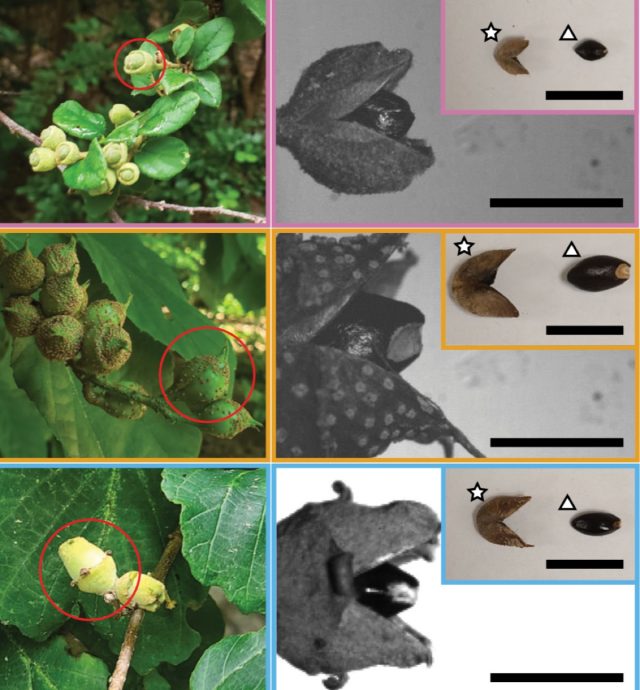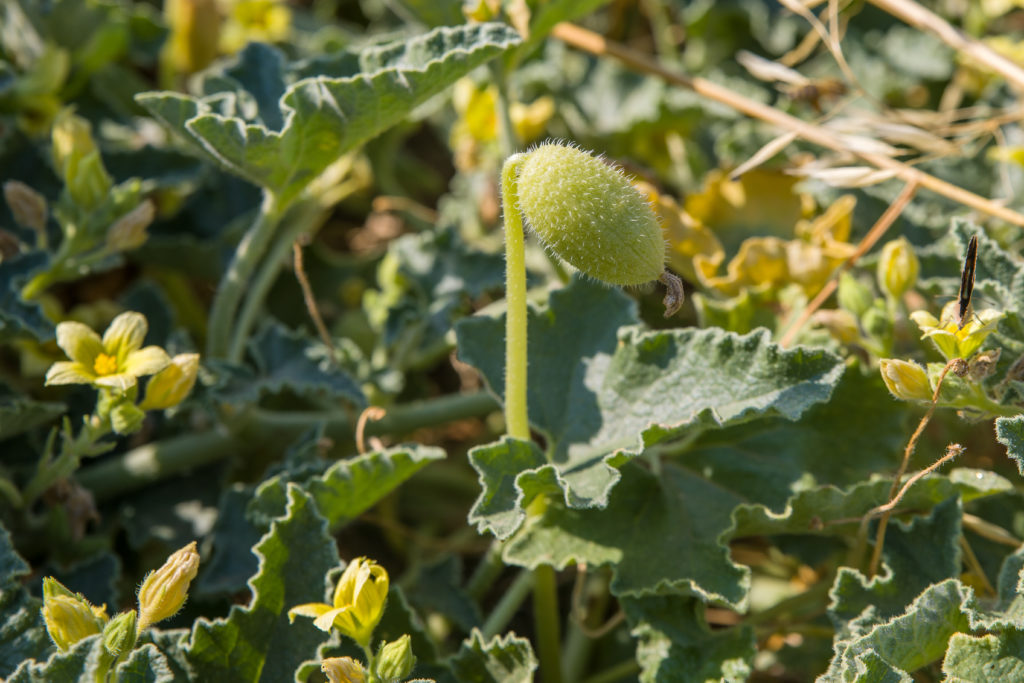The flowering shrubs known as witch hazel are perhaps best known for their use in folk medicine and as a natural topical skin ointment. But the seeds are also of interest to biophysicists and engineers because witch hazel capsules can shoot them out at incredibly fast speeds, thanks to a built-in spring-loaded mechanism. Researchers at Duke University have figured out why—contrary to expectations—the seed launch speeds are roughly the same, even though seeds across species can have substantially different masses. They described their results in a new paper published in the Journal of the Royal Society Interface.
“People ask me all the time, ‘Why are you looking at seed-shooting plants?’” said co-author Justin Jorge, a graduate student at Duke. “It’s the weirdness of their springs. When we think of springy things, we typically think of rubber bands, coils, or archery bows. But in biology, we have all these weird, complex shapes. Perhaps there are some benefits to these shapes that can be used to improve the design of synthetic springs, such as those used in small jumping robots, but first we need to understand how these biological springs work.”
According to Jorge and his co-author, advisor Sheila Patek, there are countless examples of biological springs in nature spanning a wide range of size scales and functions, including froghoppers, cannonball fungus, and carnivorous bladderwort plant traps—all of which use those mechanisms to launch projectiles. Trap-jaw ants use spring actuation to launch their mandibles to capture prey, while grasshoppers use their springy legs to kick away predators. Both species, as well as the froghopper, can also use the mechanism to launch their bodies. And flowering plants like the witch hazel use spring actuation to launch seeds out of their fruits.
Jorge was fascinated by the latter. The basic mechanism involves the smooth projectile seed and the hard structure that encases it, called the endocarp. When it's time to disperse the seed, the woody endocarp begins to dry out (desiccate) and deform, and this deformation applies a force on the seed. But the seed resists that deforming force, so the pressure builds up from all the stored (potential) energy in the endocarp. Finally, that pressure becomes large enough to overcome the seed's resistance, and the seed is ejected forcefully, often hitting speeds of 30 feet per second in half a millisecond. Faster speeds mean better propagation of the seeds so the species can go forth and multiply.

To learn more, Jorge first collected witch hazel fruits from three different species from Duke Gardens and Duke Forest, both in Durham, North Carolina. Each intact fruit was attached to a metal block by the base (so that the endocarp was free to recoil) using cyanoacrylate glue. The metal block was then clamped into place, and launching seeds were filmed with a high-speed camera at 100,000 frames per second while their trajectories were auto-tracked. Post-launch, Jorge collected the seeds and ran various materials characterization tests on them, in addition to measuring the mass of both seeds and endocarps, to calculate the ratio between those two variables.
There is typically a trade-off between a projectile's mass and its launch speed, with, for example, heavier arrows fired by a crossbow moving more slowly than lighter arrows. But Jorge and Patek found that the speed launch speeds of the witch hazel seeds were basically the same despite their different masses. (Some seeds weighed less than a grain of rice at just 15 milligrams, while others had ten times that mass.)
"A crossbow can shoot heavier arrows at similar or even greater speeds than lighter arrows if the bowstring is drawn back further, for the heavier arrows, or if a different crossbow is used that requires more force or displacement and can thereby store more elastic potential energy," Jorge and Patek wrote. And at least one species of mantis shrimp can also increase elastic potential energy storage in proportion to increases in body mass. The witch hazel has developed a similar adaptation. Those with heavier seeds also have larger endocarps that can store more elastic potential energy. The next step will be to analyze the various forces acting on a witch hazel seed as it flies through the air.
The lessons learned from such research could help improve robotic motors and spring-actuated systems. The fact that witch hazel seeds used a single structure as both motor and spring represents a significant advantage, according to Jorge and Patek. For example, a 2021 study reported the development of a synthetic hydrogel jumper, inspired by plants, that jumps via spring actuation. This "reveals the potential for harnessing environmental energy to power actuation," they concluded. "The witch hazel and other seed-shooting plants provide a wealth of examples of materials and geometries used to form combined motor-spring structures."
Journal of the Royal Society Interface, 2023. DOI: 10.1098/rsif.2023.0234 (About DOIs).
Listing image by YouTube/Duke University



3175x175(CURRENT).thumb.jpg.b05acc060982b36f5891ba728e6d953c.jpg)

Recommended Comments
There are no comments to display.
Join the conversation
You can post now and register later. If you have an account, sign in now to post with your account.
Note: Your post will require moderator approval before it will be visible.